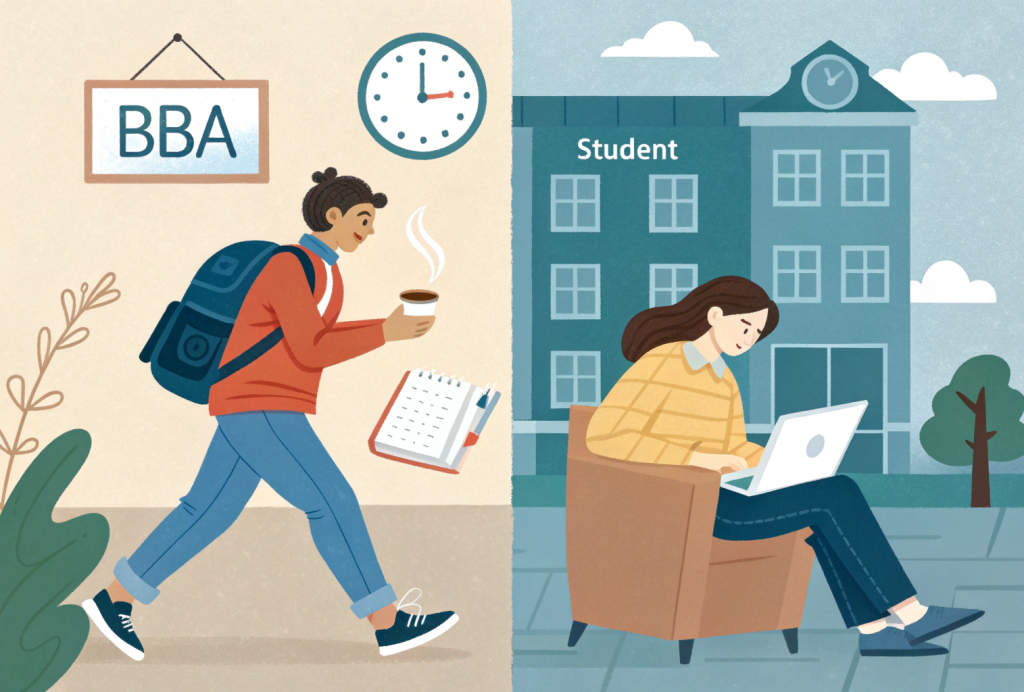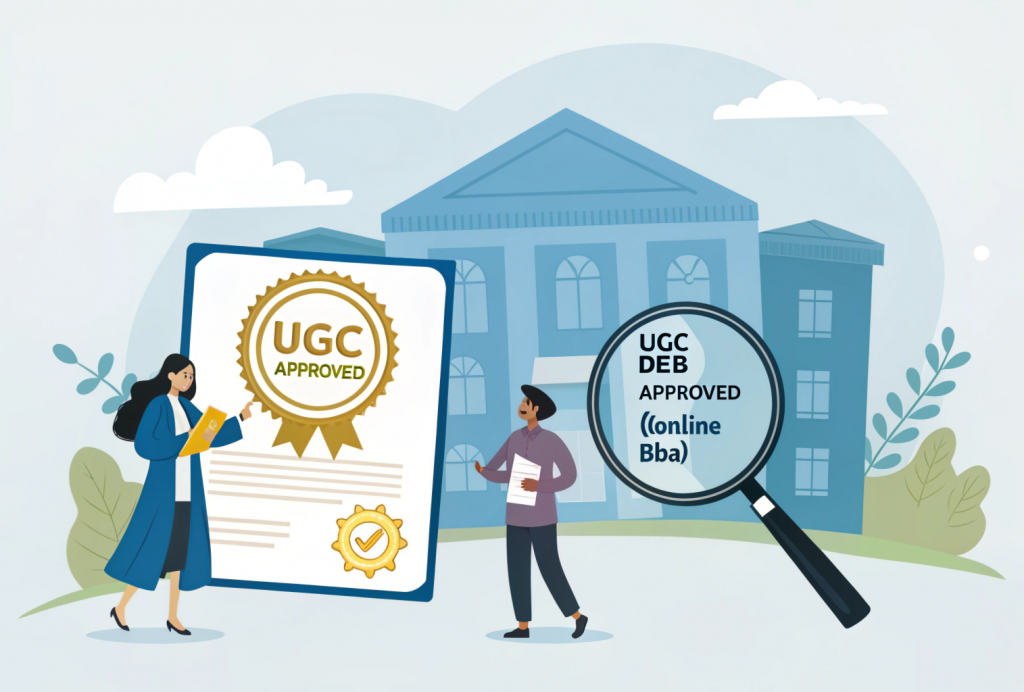An Online BBA degree (Bachelor of Business Administration) is a three-year undergraduate program that you can complete entirely online. It offers the same curriculum and value as a traditional BBA but gives you the flexibility to study from anywhere, at your own pace. As long as it’s from a UGC-DEB approved university, it’s fully recognized across India.
The online format makes it a great option for working professionals, students in remote areas, or anyone who prefers a more flexible learning experience. You’ll learn core business subjects like management, marketing, finance, and HR, all through online lectures, assignments, and virtual assessments.
What Does a Traditional BBA Look Like Today?

A traditional BBA is what most people imagine when they think of college — attending classes on campus, sitting in lecture halls, taking part in group discussions, and interacting with professors and classmates face-to-face.
It usually follows a fixed schedule, with classes held at specific times throughout the week. The structure helps students stay on track and maintain a steady routine. You also get access to campus facilities like libraries, computer labs, and placement cells, which can be helpful for both learning and career planning.
One of the biggest advantages of a traditional BBA is the overall college experience — things like student clubs, networking events, internships, and real-time classroom interaction. These in-person experiences often help in building confidence, improving communication skills, and creating a strong peer network.
In short, a traditional BBA is best suited for those who prefer classroom learning, enjoy campus life, and want that face-to-face interaction with teachers and fellow students.
Cost Breakdown: Which Option is More Budget-Friendly?

When it comes to cost, there’s a big difference between an online BBA and a traditional BBA — and it’s not just about the tuition.
A traditional BBA usually comes with higher overall expenses. Apart from tuition fees, you also have to factor in costs like hostel rent or PG accommodation, daily meals, travel, books, and other campus-related charges. These additional living expenses can make the total cost quite a bit more than expected.
On the other hand, an online BBA is generally much more affordable. Tuition fees are often lower, and you don’t have to worry about relocating, paying for accommodation, or commuting. Plus, study materials are often provided digitally, which means fewer extra costs.
There’s also the opportunity cost to think about. With an online BBA, you can work part-time or even full-time while studying, which helps you earn while you learn — something that’s tough to manage in a full-time traditional setup.
So, if budget is a major factor for you, the online BBA clearly has the edge in terms of affordability and flexibility.
Flexibility & Time Management: Which One Fits Your Life Better?

One of the biggest differences between an online BBA and a traditional BBA is how they handle time and schedules.
A traditional BBA follows a fixed routine. You attend classes at set times, follow a campus calendar, and have limited control over your daily schedule. This structure is great if you like consistency and work best with a clear timetable. But it can be a bit tough if you have other responsibilities or need more flexibility.
In contrast, an online BBA gives you the freedom to learn on your own time. Most of the lectures are recorded, so you can watch them whenever it suits you — whether it’s early in the morning or late at night. This makes it ideal for working professionals, entrepreneurs, or anyone who needs to balance studies with other commitments.
The key difference? Online BBA puts you in control of your time, while traditional BBA gives you a ready-made structure. It really comes down to your personal learning style and daily routine.
If you’re someone who likes working at your own pace, online might be the better fit. But if you prefer a disciplined, classroom-based environment, traditional could be the way to go.
Career Prospects & Industry Perception

A common question people have is — “Will employers treat an online BBA the same as a traditional one?” And honestly, the answer depends on a few things.
If your online BBA is from a recognized and UGC-DEB approved university, most employers see it as just as valid as a traditional degree. What really matters to them is your skills, knowledge, and how well you can apply what you’ve learned — not whether you sat in a classroom or watched lectures online.
That said, some companies still lean slightly towards traditional degrees, especially when they value on-campus experiences like internships, group work, and face-to-face networking. But this gap is closing fast. In today’s digital-first world, many industries actually appreciate candidates who can manage time well, learn independently, and are comfortable using tech — all things you pick up during an online program.
In terms of career prospects, both online and traditional BBA graduates can apply for the same roles — whether it’s in marketing, HR, finance, sales, or even for MBA programs later on.
The bottom line? As long as your degree is legit and you build the right skills, both paths can lead to great career opportunities.
Accreditation & Recognition: What Really Matters?

When choosing between an online or traditional BBA, one thing you should never ignore is accreditation. It’s what makes your degree valid and trusted — not just by employers, but also by other universities if you plan to study further.
In India, two major bodies handle this:
- UGC (University Grants Commission) – It ensures your university or college is officially recognized.
- AICTE (All India Council for Technical Education) – While more focused on technical programs, AICTE approval adds extra credibility, especially for management-related courses.
If you’re going for an online BBA, make sure the university is UGC-DEB approved (DEB stands for Distance Education Bureau). This means the degree is valid and accepted just like a regular BBA.
Employers do care about where your degree comes from. A recognized university with proper accreditation gives them confidence that you’ve received quality education. On the flip side, if the program isn’t approved, it might not be taken seriously — no matter how much you learned.
So, before picking any course, check the official website of UGC or the university itself for accreditation info. It only takes a few minutes but can save you from bigger problems later.
Explore our online programs to become future-ready
Transform your career with industry-aligned courses designed by experts.
Learning Experience: Peer Interaction, Faculty Access & Practical Exposure

The learning experience in a BBA program isn’t just about textbooks — it’s also about the people you learn with and from. And this is where online and traditional BBA programs offer very different vibes.
In a traditional BBA, you’re on campus, surrounded by classmates. You get to take part in group discussions, classroom debates, and college events. There’s easy face-to-face access to faculty, so you can ask questions right after class or drop by their office. Plus, practical exposure like internships, workshops, and live projects is often a big part of the program.
Now, in an online BBA, interaction happens virtually — through discussion forums, group chats, and live sessions. While it’s not exactly the same as in-person bonding, many programs have built-in tools for collaboration and doubt-solving. Some even offer virtual internships or case study projects to give you real-world experience.
Faculty access in online programs is also improving. You can email, message, or schedule one-on-one calls with professors. It just requires a bit more self-initiative compared to walking up to someone on campus.
To sum it up:
If you’re someone who enjoys real-time group learning and being part of campus life, traditional BBA might feel more engaging. But if you’re comfortable in digital spaces and can stay active in virtual communities, online BBA can still offer a solid learning experience.
Online BBA Degree vs Traditional BBA: Conclusion
At the end of the day, choosing between an online BBA and a traditional BBA comes down to your personal goals, lifestyle, and learning style.
If you enjoy structured schedules, face-to-face classes, campus life, and direct interaction with faculty and peers, then a traditional BBA might be the better fit for you. It offers a full college experience and can be great for networking and hands-on exposure.
On the other hand, if you need flexibility, want to study from home, or plan to work while pursuing your degree, an online BBA could be the smarter choice. It’s budget-friendly, convenient, and perfect for self-motivated learners who prefer to set their own pace.
Ask yourself a few questions before deciding:
- Do I need to work or manage other responsibilities while studying?
- Am I comfortable learning online and staying self-disciplined?
- Do I want the full college experience or just the degree?
There’s no one-size-fits-all answer. Both options have their strengths — it’s all about choosing the one that fits your life best.


Leave a Reply